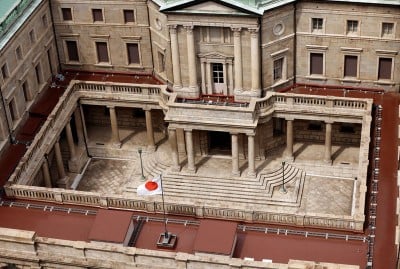 © Reuters. Japanese national flag is hoisted atop the headquarters of Bank of Japan in Tokyo, Japan September 20, 2023. REUTERS/Issei Kato/File Photo US10Y... +0.80% Add to/Remove from Watchlist Add to Watchlist Add Position
© Reuters. Japanese national flag is hoisted atop the headquarters of Bank of Japan in Tokyo, Japan September 20, 2023. REUTERS/Issei Kato/File Photo US10Y... +0.80% Add to/Remove from Watchlist Add to Watchlist Add Position Position added successfully to:
+ Add another position Close
By Leika Kihara and Yoshifumi Takemoto
TOKYO (Reuters) - The Bank of Japan may prefer to go slow in ending ultra-low interest rates, but the weak yen and risks of an inflation overshoot could prod it to act before year-end, former central bank official Hiromi Yamaoka told Reuters on Wednesday.
Under pressure to phase out years of massive monetary stimulus amid rising inflation, the BOJ on Tuesday loosened its grip on long-term interest rates by tweaking its controversial bond yield control policy.
The yen tumbled after the decision as the move, as well as dovish comments from Governor Kazuo Ueda, confounded market expectations for bolder steps toward an exit.
The BOJ's yield curve control (YCC) policy, which pegs the 10-year bond yield around 0%, is inherently difficult to exit as ending the programme could cause an abrupt spike in yields that would inflict huge losses on bond holders, Yamaoka said.
"The BOJ must tread carefully towards a soft-landing. As such, it probably wants to move very slowly towards any exit," said Yamaoka, who has experience overseeing the BOJ's market operations and retains close ties with incumbent policymakers.
Yamaoka worked under Ueda when he was BOJ board member from 1998 to 2005, a period which predates the aggressive easing that began in 2013 under former governor Haruhiko Kuroda.
The BOJ's dovish language and focus on next year's wage negotiations may give markets the impression any exit from ultra-easy policy won't come until around spring 2024, he said.
"But the BOJ may not afford to wait that long because the situation surrounding inflation could change sharply," Yamaoka said, pointing to the risk of Japan's inflation staying high for longer than expected.
The yen's downtrend may also pile pressure on the BOJ to exit ultra-low rates sooner than it wants, he added.
"The BOJ doesn't have much time left, a point governor Ueda is probably mindful of," said Yamaoka. "I wouldn't rule out the possibility of the BOJ acting by year-end."
As part of efforts to fire up inflation to its 2% target, the BOJ has capped the 10-year bond yield around zero since 2016 under YCC. It also applies a 0.1% charge on excess reserves parked with the central bank under its negative rate policy.
With inflation exceeding its 2% target for more than a year, many market players are betting on the chance of an end to YCC and negative rates next year.
Ueda has played down the chance of a near-term exit on the view the BOJ must wait until there is more evidence that inflation will sustainably hit 2% backed by solid demand. The central bank chief's cautious stance underscores worries that a premature end to easy policy could undo the bank's decade-long efforts to pull Japan permanently out of economic stagnation.
Yamaoka said the BOJ must end negative rates sometime in the near future as the cost of the policy, such as causing sharp yen falls, exceeds the benefits.
While the BOJ will likely continue relaxing its control on long-term rates, it won't remove YCC altogether as doing so would cause too much disruption in a country where the public, markets and the government are accustomed to years of near-zero borrowing costs, he said.
The fate of negative rates and YCC will likely be debated as a single package as the two policies form the BOJ's broader stimulus programme, Yamaoka said.
"An successful exit from these policies is a narrow path," Yamaoka said. "But it's something the BOJ needs to tackle as soon as it possible."
Weak yen, inflation overshoot may prod BOJ to phase out stimulus by year-end: ex-BOJ official